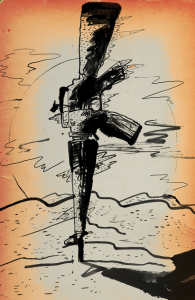 A few years ago, I was leaked a large trove of documents from a contractor deeply engaged in the counterinsurgency war in Afghanistan. As I slowly made my way through them, I decided I had to go back to my years of studying the history of U.S. involvement in Vietnam to understand what I was dealing with. This article, just published in The Baffler, is the result. I couldn’t have done it without the support of several friends and colleagues, including Mark Ames of Pando and Jason Leopold of Vice, both of whom provided valuable insight and suggestions. I also owe a huge thanks to Matthew Hoh, the Marine vet who resigned from the State Department in 2009 to protest the war; he helped frame the story and, as you’ll see my conclusions. Here’s how it starts:
A few years ago, I was leaked a large trove of documents from a contractor deeply engaged in the counterinsurgency war in Afghanistan. As I slowly made my way through them, I decided I had to go back to my years of studying the history of U.S. involvement in Vietnam to understand what I was dealing with. This article, just published in The Baffler, is the result. I couldn’t have done it without the support of several friends and colleagues, including Mark Ames of Pando and Jason Leopold of Vice, both of whom provided valuable insight and suggestions. I also owe a huge thanks to Matthew Hoh, the Marine vet who resigned from the State Department in 2009 to protest the war; he helped frame the story and, as you’ll see my conclusions. Here’s how it starts:
Eight years ago, as Washington was making the transition from the nightmare years of George W. Bush to the endless possibilities of Barack Obama, national security elites were transfixed by a military doctrine called counterinsurgency.
The modern counterinsurgency faith stirred to life in the glory days of JFK’s “hearts and minds” campaign in Vietnam. Its champions promised to win over conquered lands by eschewing raw firepower for enlightened social projects. They pledged to use cash, economic aid, and military training to convince locals that America offered their last, best hope for a better life. When they retrofitted the doctrine to help salvage the disastrous 2003 invasion and occupation of Iraq, they called themselves “COINdinistas.”
Leading the twenty-first-century revival of counterinsurgency was an up-and-coming army general, David H. Petraeus, who had participated in nearly every major U.S. intervention overseas since Vietnam, including those in El Salvador, Haiti, Bosnia, and Iraq. After preaching the COIN gospel for decades on the margins of the national security establishment, Petraeus was appointed in 2007 to command U.S. forces in Iraq. There, he finally got his chance to practice what his followers liked to call the “new American way of war.”
Within a year of Petraeus’s ascension, the Sunni insurgents and the Al Qaeda hardliners had been subdued, and the innovative tactician was suddenly a national hero. According to Washington mythology, Petraeus’s counterinsurgency methods, together with Bush’s exquisitely timed “surge” of thirty thousand troops, finally allowed the Pentagon to extricate the United States from Iraq, and reverse the invasion’s rapid plunge into imperial folly.
Strangely, this myth also won the hearts of many antiwar liberals and Democrats, who seized on the humanitarian ethos that sparks counterinsurgency efforts as the antidote to the neocon model of unilaterally blundering into one “war of choice” after another. “All of them glommed onto this narrative,” Gian Gentile, an Iraq combat veteran and the author of Wrong Turn: America’s Deadly Embrace of Counterinsurgency, told me. “Why? Because it maintains the idea that American wars in foreign lands still work. And the proof in the pudding was in the surge in Iraq.”
But for these liberal strategists, the proving ground for mature counterinsurgency techniques would be Afghanistan—the conflict that President Bush had sidestepped in favor of Iraq and that candidate Obama described as a war of necessity. By 2008, the turnaround was complete and counterinsurgency was now “the coin of the realm,” as Time sardonically put it.
Indeed, president Obama seized the earliest chance during his first year in office to launch his own “surge” in Afghanistan—and along with it, he embraced the hearts-and-minds strategy promoted by Petraeus and his new commander in Kabul, Gen. Stanley McChrystal. Flush from their latest success, the COINdinistas were riding high. David Kilcullen, the Australian Army officer who served as Petraeus’s senior counterinsurgency adviser in Iraq and later Afghanistan, began talking of a “Global COIN” to fight terrorism from Somalia to the Philippines, winning the admiration of CNN’s Peter Bergen and other prominent terrorism experts. A new era of warfare seemed to be upon us…
To continue, click here.
